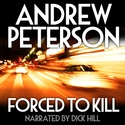
 Operation Neptune Spear seems an appropriate name for the raid that ended Osama Bin Laden’s life. In Roman mythology, Neptune is the god of water and the sea. It’s common knowledge that SEAL Team 6 of the United States Navy conducted the raid. The Navy SEAL emblem contains a trident, Neptune’s preferred hunting weapon.
Operation Neptune Spear seems an appropriate name for the raid that ended Osama Bin Laden’s life. In Roman mythology, Neptune is the god of water and the sea. It’s common knowledge that SEAL Team 6 of the United States Navy conducted the raid. The Navy SEAL emblem contains a trident, Neptune’s preferred hunting weapon.
So who are Navy SEALs? SEAL teams are the primary special forces of the Naval Special Warfare Command. The SEALs were officially established during the Kennedy Administration, but their roots can be traced back to WWII. The acronym is derived from Sea, Air, and Land. Although Navy SEAL teams comprise the maritime component of the United States Special Operations Command, they’re often used for land based missions.
The term “special forces” has evolved to encompass military and civilian units that are deployed for use in high risk missions that standard units aren’t equipped to handle. Although technically not special forces in the military sense, the FBI, ATF, DEA, and other federal law enforcement agencies employ domestic SRTs (Special Response Teams) in much the same way as the military uses its special forces overseas. It’s not my intent to make any kind of comparison between civilian SRTs and military special forces, I’m just pointing out that differing types of specialized units are found in nearly all law enforcement and military commands.
I think these real-life heroes make excellent models for thriller novels. The main character in my thriller series, Nathan McBride, is a former special forces soldier. He was the “shooter” half of a two-man, Marine Corps scout sniper team attached the CIA to conduct specialized “take out” missions all over the world. As you might imagine, he’s somewhat reserved, generally doesn’t trust people, and only has one true friend-his former spotter. Because of the covert nature of his missions, he’ll never be publically recognized for the service and sacrifice he made to his country.
Nathan’s been on both sides of the violence equation. Fifteen years ago, a botched mission forced him into early retirement. After being captured in Nicaragua, he fell into a brutal interrogator’s hands. Three weeks later when finally rescued, he was close to death. Although he’s got physical and psychological scars, he doesn’t dwell in the past. He doesn’t drink himself into unconsciousness or lash out at strangers. He’s adopted the attitude of; It happened, get over it. But is it really that simple? Can someone with a tormented past just “get over it?” It leaves the door open for all kinds of inner conflict.
I think Nathan’s character is what makes him interesting. He helps the little guy. He’s not the kind of man who will look the other way while an adult abuses a child in public and he’ll never fail to help a police officer in trouble. He is the kind of man who will assist an elderly person make it into a life boat on sinking ship-even at the risk of his own life. He has a soft heart for animals, hates bullies, and kicks ass when the situation demands it. Nathan isn’t suicidal or self destructive, but he’s driven by motivations that go beyond what most people experience in tight situations.
At writers conferences, the topic of “research” often comes up. I’m often asked, “Is that what you used to do for a living?” My answer is always the same. No, I’ve never been a Marine sniper or a CIA operations officer. And although they don’t put their next question into words, I know what they’re thinking: Then how can you write about it?
I always respond like this: “As far as I know, Anne Rice has never been a vampire.” This usually brings a chuckle, but I also see the light go on behind their eyes. It’s a work of fiction, not an autobiography. Many authors have written books from the opposite gender’s point of view. People are people. We all have needs and desires. A bullet doesn’t discriminate based on gender, race, or religion. It plows through flesh like an equal opportunity destroyer.
I do tons of research for my novels. How much goes into the books? About ten percent. Do I really leave ninety percent of all that reading, traveling, interviewing, and internet browsing out of my books? As a thriller novelist, there’s an important point to remember. I’m first and foremost, an entertainer. Text books on the intricate skill of long distance shooting and the nuts and bolts of plastic explosives already exist.
There are no absolutes. In some techno thrillers, the research and technical aspects of the story actually become a “character” and require much more page space. Can a thriller entertain and educate at the same time? Yes, absolutely. But it’s a fine line and we need to be careful. What may be interesting to us, as authors, may not be interesting to readers.
Personally, my research helps me understand the way Nathan sees the world. When I’m editing manuscript, I’m constantly asking myself. “Do I really need this in here?” Note I said need, not want. As a conscientious writer, I have to know the difference.
Both of my novels contain scenes involving “enhanced” interrogation to one degree or another. I don’t get into graphic detail, but I take you right to the edge. I don’t make the rules-the world is what it is-but there’s no way to sugarcoat certain aspects of Nathan’s world without slaying realism. There are no politics in my books, I don’t get into the debate of “should we” or “shouldn’t we.” The world is what it is. Whether we believe in it or not, enhanced interrogation exists.
I don’t personally know any Navy SEALs, and I’ve never asked a Marine scout sniper what it’s like to shoot someone at 1,200 yards or perform a field interrogation. Those are deeply personal questions and I wouldn’t presume to intrude on that real estate. Nathan McBride is my creation and he’s not based on an actual individual.
I can say this with certainty; When all else is boiled away, he’s first and foremost… A person.
FORCED TO KILL, audio book available at Amazon.com and Audible.com
Comment to win a $25 VISA gift certificate and a copy on CD of FORCED TO KILL by Andrew Peterson
To comment on Andrew Peterson’s blog please click here.


No Comments
Comments are closed.